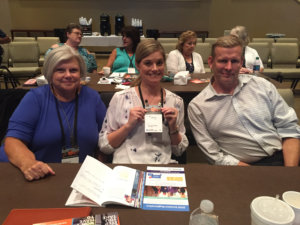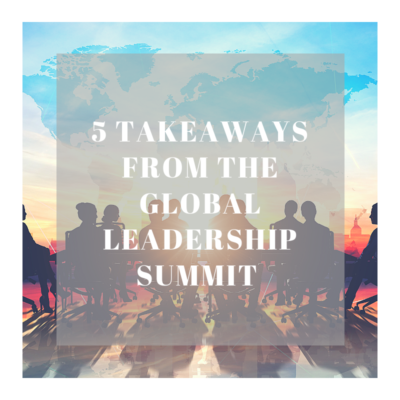5 Takeaways from the Global Leadership Summit (well I’ve just got to share 6!)
Debbie Franklin was part of a group of leaders from Inspirien who recently attended The Global Leadership Summit 2019. Here she shares information from some of her favorite speakers and how to get more information from GLS.

1. Everyone wins when the leader gets better!
How you lead matters more than you can image, so how do you do this –one of the best ways is by realizing that you have something to learn from everyone. Are you spending your days in ways for you to get the best return on your investment of time, money, and resources?
GETMO – good enough to move on – realize that perfection is often the enemy of progress. The pursuit of excellence will motivate you, while the pursuit of perfection will often not be worth the investment! Perfection is often the enemy of progress.
Remember this – you have everything you need for everything you’re called to do! God guides by not only what he provides, but also by what he withholds!
STEP INTO IT! Tell me what you’re called to do and why it matters. If you commit to the ‘why’, you’ll find the ‘how’! Step out of your doubts and fears and into your calling.
Craig Groeschel, Co-Founder & Senior Pastor of Life Church and host of Craig Groeschel Leadership Podcast.
2. Generations are not determined by the year they were born, but by traits that drive generational behaviors.
When discussing generational differences – how do you separate ‘myth’ from the ‘truth’? There are three trends that shape generations:
- Parenting – parenting influences everything we do – both how we were parented and how we parent. Entitlement is a learned behavior.
- Technology – every generation has a natural relationship with technology. Technology is only new if you remember it the way it was… some generations will never remember life without technology
- Geography- Baby boomers know geography, can read a map. The generations after boomers only know GPS. Boomers define and measure work ethic in hours and weeks – ‘can I see you?’; the following generations don’t need that.
So, recognizing these differences, what actions can we take as leaders?
- Provide specific examples with the performance you expect — different generations interpret instructions differently – make sure you not only list but define your expectations clearly.
- Messaging – ‘show the end and then tell me how’ – Generation X and Millennials are not outcomes-driven like previous generations were – be careful how you communicate expectations.
- Provide more frequent feedback – your team needs to hear and interact with the boss frequently, not ‘fear’ a meeting with the boss, like the old feeling of ‘being called into the bosses office’.
People in every generation can be leaders – we just need to understand them to equip and give them the tools they need.
Jason Dorsey is the #1 rated Gen Z and Millennial speaker and researcher.
3. People don’t want you to be their hero – our role is the hard work we invest in ourselves, so we can equip and inspire others to be the heroes in their stories.
Learning is actually a cycle – there is no stair-stepped method to make it to the top. The four stages of learning include:
- Unconscious incompetence
- Conscious incompetence
- Conscious competence
- Unconscious competence
Liz Bohannon told her story of founding a socially-conscious fashion brand that creates educational opportunities for women around the world through learning that “you can’t find your passion, but you can build it”. She goes on to share her story of being a ‘doer’ instead of just a ‘dreamer’ after she learned the hard lesson about ‘dreaming small’ realizing that small dreams have a surprising power of launching us out of waiting into creating.
Liz Bohannon, Co-founder and Co-CEO of Sseka Designs and author of Beginner’s Pluck – a book about building a life of purpose and impact now.
4. “Everyone has influence although some people probably shouldn’t,” shares Patrick Lencioni, a best-selling author who provides organizations with ideas and services that improve teamwork and provide clarity for employee engagement.
There are 2 types of leadership – servant leadership and reward-based leadership. He goes on to explain why ‘servant leadership’ is the only model for true leaders, explaining that leadership has to be sacrificial, you have to understand your lead motive in order to have effective influence.
Reward-based leaders avoid the following that often leads to unsuccessful results
- Having difficult conversations – these are a must for successful growth
- Managing direct reports – if people aren’t managed, they lose motivation; they aren’t aligned to a consensus goal and mission
- Running great meetings – bad meetings lead to bad decisions!
- Team building – you must invest in people and give them the tools to grow for success to happen
- Often repeat themselves – the CEO should really be a CRO – Chief Reminding Officer – make sure your communication reinforces the ‘right message,’ not just repeats to hear yourself talk!
Patrick Lencionic is the Founder & CEO of The Table Group and author of The Ideal Teamplayer.
5. As leaders, we are in negotiations every day – the most dangerous ones are the ones we don’t know we’re in! Chris Voss, a former FBI Hostage Negotiator, shares negotiation strategies we can use every day in the workplace, as leaders, or at home.
Two keys to negotiation are:
- Listen to hear the other side out, and
- Connect – find ways to turn the negotiation into a collaboration
He goes on to share “it’s not the WHAT, but the WHY” – why makes people defensive, we have to find ways to switch the ‘why’ to the ‘what.’
‘How’ shapes your thinking – “Be curious, it keeps you in a positive frame of mind. The core of negotiations is not compassion but understanding where someone is coming from”.
Chris Voss, former FBI Hostage Negotiator, CEO & Founder of The Black Swan Group and author of Never Split the Difference – negotiating as if your life depended on it.
6. Bear Grylls, adventurer, writer, and TV host shared ‘the Four F’s from his new book Soul Fuel as he talked about life lessons he’s learned on courage, kindness and never giving up.
Failures – there is power in failures. Failures far outweigh successes; they build resilience and are a doorway that builds your story
Fear – is a part of life; it’s what makes us real! The only way through fear is right through the middle, become friends with it — when you edge toward it, it melts away!
Fire – is what keeps telling you to move forward – sometimes it’s hidden, sometimes it’s just an ember, but it is a God-given gift that can change everything! NGU- never give up!
Faith – is a journey. It’s a point of awareness -to walk it every day takes courage. We must remember that God says’ – I am known, I am loved, and I am forgiven! We all face our Everest – Everest is a state of mind.
Bear Grylls, adventurer, number 1 best selling author who has sold over 15 million books; his latest book on faith is Soul Fuel.
For more information on these leaders and to hear from others from the Global Leadership Summit team – go to www.GlobalLeadership.org.

